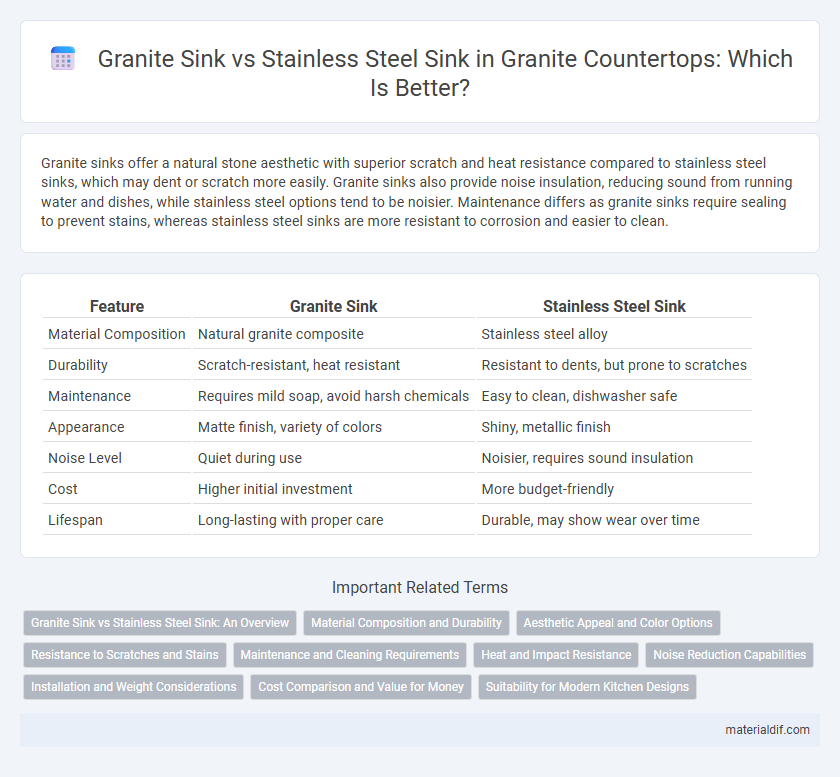Granite sinks offer a natural stone aesthetic with superior scratch and heat resistance compared to stainless steel sinks, which may dent or scratch more easily. Granite sinks also provide noise insulation, reducing sound from running water and dishes, while stainless steel options tend to be noisier. Maintenance differs as granite sinks require sealing to prevent stains, whereas stainless steel sinks are more resistant to corrosion and easier to clean.
Table of Comparison
| Feature | Granite Sink | Stainless Steel Sink |
|---|---|---|
| Material Composition | Natural granite composite | Stainless steel alloy |
| Durability | Scratch-resistant, heat resistant | Resistant to dents, but prone to scratches |
| Maintenance | Requires mild soap, avoid harsh chemicals | Easy to clean, dishwasher safe |
| Appearance | Matte finish, variety of colors | Shiny, metallic finish |
| Noise Level | Quiet during use | Noisier, requires sound insulation |
| Cost | Higher initial investment | More budget-friendly |
| Lifespan | Long-lasting with proper care | Durable, may show wear over time |
Granite Sink vs Stainless Steel Sink: An Overview
Granite sinks offer superior durability and a natural, elegant appearance compared to stainless steel sinks, which are known for their lightweight and cost-effectiveness. Granite sinks resist scratches, heat, and stains better due to their solid stone composite material, while stainless steel sinks provide excellent resistance to corrosion and easy maintenance. Choosing between granite and stainless steel sinks depends on preferences for aesthetics, durability, and budget considerations in kitchen design.
Material Composition and Durability
Granite sinks are composed of a blend of natural stone and resin, offering exceptional resistance to scratches, heat, and stains due to their dense, non-porous surface. Stainless steel sinks are made from a durable alloy of steel and chromium, providing excellent corrosion resistance and impact strength but are more prone to visible scratches and dents over time. The material composition of granite sinks allows for superior durability in resisting everyday wear, while stainless steel sinks excel in hygiene and ease of maintenance.
Aesthetic Appeal and Color Options
Granite sinks offer a natural, luxurious aesthetic with a variety of rich, earthy tones that complement both traditional and modern kitchen designs. Stainless steel sinks provide a sleek, contemporary look with a shiny, metallic finish, available mainly in silver shades and a limited range of brushed or matte options. The diverse color palette of granite sinks enhances customization, while stainless steel reflects a minimalist and industrial style favored in modern homes.
Resistance to Scratches and Stains
Granite sinks offer superior resistance to scratches and stains due to their composite material made from natural stone and resin, which creates a durable, non-porous surface that prevents discoloration and surface damage. Stainless steel sinks, while resistant to rust and corrosion, are more prone to scratches and can show stains from hard water or metal deposits over time. The hardness rating of granite sinks typically ranges around 7 on the Mohs scale, far higher than stainless steel, which contributes to their enhanced durability in high-use kitchen environments.
Maintenance and Cleaning Requirements
Granite sinks require gentle cleaning with non-abrasive cleaners to prevent surface damage and periodic sealing to maintain their stain resistance and durability. Stainless steel sinks are easier to clean with common household detergents and do not require sealing, but they can show water spots and scratches more readily. Both materials benefit from routine wiping to prevent mineral deposits and maintain their appearance over time.
Heat and Impact Resistance
Granite sinks offer superior heat and impact resistance compared to stainless steel sinks, withstanding temperatures up to 480degF without damage. The natural composition of granite provides a dense, durable surface that resists chipping and scratching from heavy impacts. Stainless steel sinks, while heat-resistant to around 300degF, are more prone to dents and surface damage from sharp or heavy objects.
Noise Reduction Capabilities
Granite sinks provide superior noise reduction capabilities compared to stainless steel sinks due to their dense composition and sound-absorbing properties. The granite material minimizes water impact noise, creating a quieter kitchen environment. In contrast, stainless steel sinks tend to produce louder sounds when exposed to running water or clattering dishes, as the thinner metal amplifies vibrations.
Installation and Weight Considerations
Granite sinks typically require professional installation due to their heavy weight, averaging between 30 to 70 pounds, which demands sturdy support and precise countertop modifications. Stainless steel sinks are much lighter, generally weighing around 10 to 20 pounds, enabling easier DIY installation and less strain on cabinetry. Proper weight considerations ensure durability and stability in both materials, influencing long-term performance and maintenance costs.
Cost Comparison and Value for Money
Granite sinks typically cost between $250 and $600, offering durability and a natural aesthetic that justifies the higher price compared to stainless steel sinks, which range from $100 to $300. Although stainless steel sinks are more budget-friendly and resistant to staining, granite sinks provide superior scratch resistance and long-term value due to their robustness and timeless appeal. Choosing between the two depends on prioritizing upfront cost savings or investing in a premium, long-lasting kitchen fixture.
Suitability for Modern Kitchen Designs
Granite sinks offer a natural, luxurious appearance and exceptional durability, making them ideal for modern kitchens aiming for an elegant, high-end look. Stainless steel sinks provide a sleek, versatile finish that complements minimalist and industrial kitchen styles while resisting stains and corrosion. Choosing between granite and stainless steel depends on desired aesthetics, maintenance preferences, and overall kitchen design themes.
Granite Sink vs Stainless Steel Sink Infographic

 materialdif.com
materialdif.com